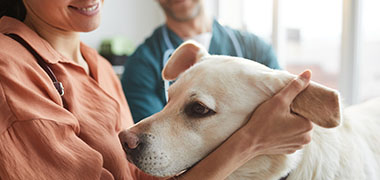
This role has a moderate level of AI exposure. AI can enhance efficiency for some tasks, but this job still relies on human skills and decision-making.
Explore all careersA Veterinary Emergency Nurse supports the treatment of animals in critical situations, assisting with surgeries and monitoring their recovery.
Get qualified to work as a Veterinary Emergency Nurse with a course recognised across Australia. Speak to a training provider to learn more.




In Australia, a full time Veterinary Emergency Nurse generally earns $1,160 per week ($60,320 annual salary) before tax. This is a median figure for full-time employees and should be considered a guide only. As you gain more experience you can expect a potentially higher salary than people who are new to the industry.
 Courses.com.au Team
Courses.com.au Team
The number of people working in this role has increased over the last five years. There are currently 12,100 veterinary nurses working in Australia and many of them specialise as a Veterinary Emergency Nurse. Veterinary Emergency Nurses can find work in all regions of Australia.
Source: Australian Government Labour Market Insights
 Courses.com.au Team
Courses.com.au Team
A Diploma of Veterinary Nursing (Emergency and Critical Care) is an ideal qualification if you’re thinking of becoming a Veterinary Emergency Nurse. This course covers topics including preparing for a veterinary emergency, performing emergency life saving procedures on animals and delivering follow up care.
 Courses.com.au Team
Courses.com.au Team
Browse occupations related to Veterinary Emergency Nurse



For individuals aspiring to specialise in critical veterinary care, the Veterinary Emergency Nurse courses in Central Coast offer the essential training and knowledge needed to excel in the field. The region, renowned for its beautiful landscapes and thriving community, is also home to several training providers accredited to deliver specialised education in veterinary emergency nursing. By engaging in these courses, you will develop crucial skills to respond to emergencies in a veterinary setting, making a significant impact on animal health and welfare.
The Veterinary Emergency Nurse courses available in Central Coast focus on practical and theoretical components that equip students with the necessary competencies to handle emergencies effectively. Topics covered in these courses include advanced veterinary nursing techniques, emergency protocols, and the relevant legal and ethical considerations in veterinary practice. These invaluable skills are particularly relevant in a region like Central Coast, where local wildlife and domesticated animals frequently require immediate and expert care.
For those keen on progressing their veterinary careers, pursuing a qualification through recognised Registered Training Organisations (RTOs) in Central Coast is essential. By undertaking the Veterinary Emergency Nurse courses in Central Coast, you will be part of a growing field that demands skilled professionals. Upon completion, graduates are not only prepared for the fast-paced nature of emergency veterinary care, but they also emerge with a strong competitive edge in the job market.
In this picturesque part of New South Wales, training providers have tailored their programmes to suit local needs, ensuring that content is relevant to the specific challenges faced by veterinary professionals in Central Coast. This localised approach to training enhances the learning experience, enabling students to draw parallels between their training and the types of cases they may encounter in their future roles as veterinary emergency nurses.